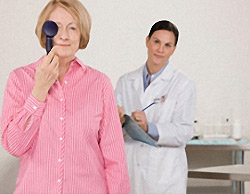recognize & respond to diabetic
danger signs
 |
Take care of your body, and it will take care of you. And in times of danger, your body can even alert you before trouble sets in. Pay close attention to crucial body parts and learn to recognize and respond to diabetic danger signs. |
Your heart
High blood sugar harms blood vessels, which can cause heart problems. Heart and blood flow problems are made worse by smoking, high blood pressure, and high cholesterol.
- Eat low-salt, low-fat foods to keep your blood pressure and cholesterol down.
- Exercise regularly to improve blood flow and lower your blood pressure and cholesterol.
- Lose weight if you are overweight. Losing even a few pounds will help keep your heart from working too hard.
- Relax and stay calm to keep your blood pressure and blood sugar under control.
- Don't smoke. If you do smoke, now is a great time to quit.
- Take your medicine every day. Ask your doctor about taking aspirin for your heart.
- See your doctor if you have cramps or pain in your legs or feet, your blood pressure is higher than 130/80, you're short of breath after a little activity, or you have a lot of swelling in your feet.
Your feet
Because diabetes affects nerves, it can make it hard to feel pain in your feet and legs. You may not know when or if you have been hurt. Diabetes can also cause problems with circulation. This makes it hard for cuts and sores to heal and can cause infection.
- Call your doctor if you see signs of trouble like pain or swelling in your feet, a cut or burn that becomes red or sore, calluses, corns, and in-grown toenails.
- Exercise to improve blood flow to your legs and feet.
- Check your feet every day. Look for cuts, sores, and blisters. Put lotion on dry spots to prevent cracks. Use a mirror to see the bottoms of your feet, or ask a family member or friend to help you.
- Keep your feet clean by washing your feet every day with mild soap and warm water. Test the water first to make sure it's not too hot. Dry your feet well, especially between your toes.
- Cut your toenails straight across. Use clippers, not pointed scissors, and be careful not to cut the skin. Never cut corns and calluses. If you have hard or thick toenails, ask your doctor if a foot specialist should cut them for you.
- Always wear socks and shoes, not sandals. Cotton socks help to keep your feet dry. Comfortable shoes help your blood flow. Never go barefoot.
- Check your shoes for any pebbles or small objects that could cut your feet.
Your kidneys
Diabetes can damage the small blood vessels in the kidneys. This prevents them from clearing the waste out of your blood. If your kidneys stop working, you'll need to have your blood cleaned by a machine (called dialysis) or have a kidney transplant.
- Keep A1C at or below 7.0. Your doctor will order an A1C blood test, which measures your average blood sugar control over the past two to three months. A1C blood tests are available during our Second Saturday screenings.
- Keep blood pressure lower than 130/80. If it gets higher, call your doctor.
- Talk to your doctor about a urine test (microalbumin and serum creatinine) at least once a year and about medicines and food that can protect your kidneys.
Your eyes
Diabetes can harm the blood vessels in your eyes. This can lead to eye disease and even blindness. You can take steps to protect your vision.
- Keep your blood sugar under control to protect sensitive blood vessels in your eyes.
- See the eye doctor (ophthalmologist or optometrist) once a year for an eye exam, even if your eyes aren't bothering you. Some types of eye disease don't have early warning signs.
- Watch for problems like blurry vision, flashes of light in your eyes, blind spots, things floating in front of your eyes, or other changes in your vision and report them to your doctor.
- Don't use tobacco. Smoking can cause high blood pressure, which can make eye problems worse.
H-E-B Health Care Services Notice of Privacy Practice | Texas State Board of Pharmacy | How to Dispose of Unused Medicines